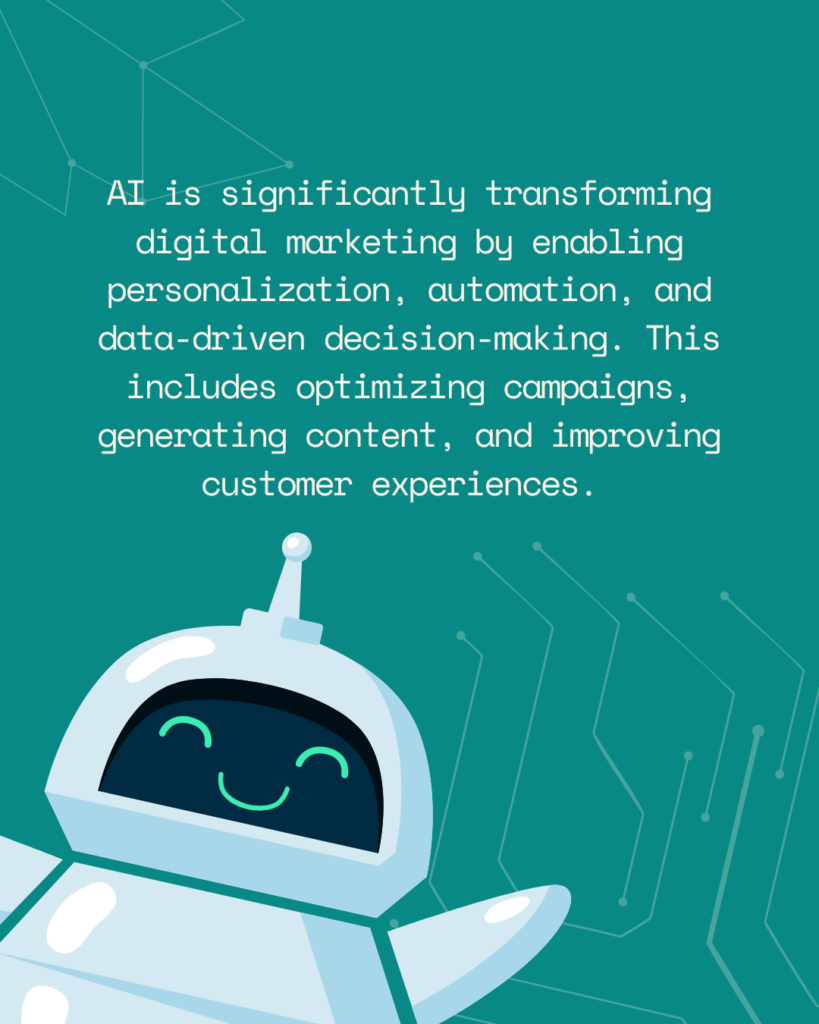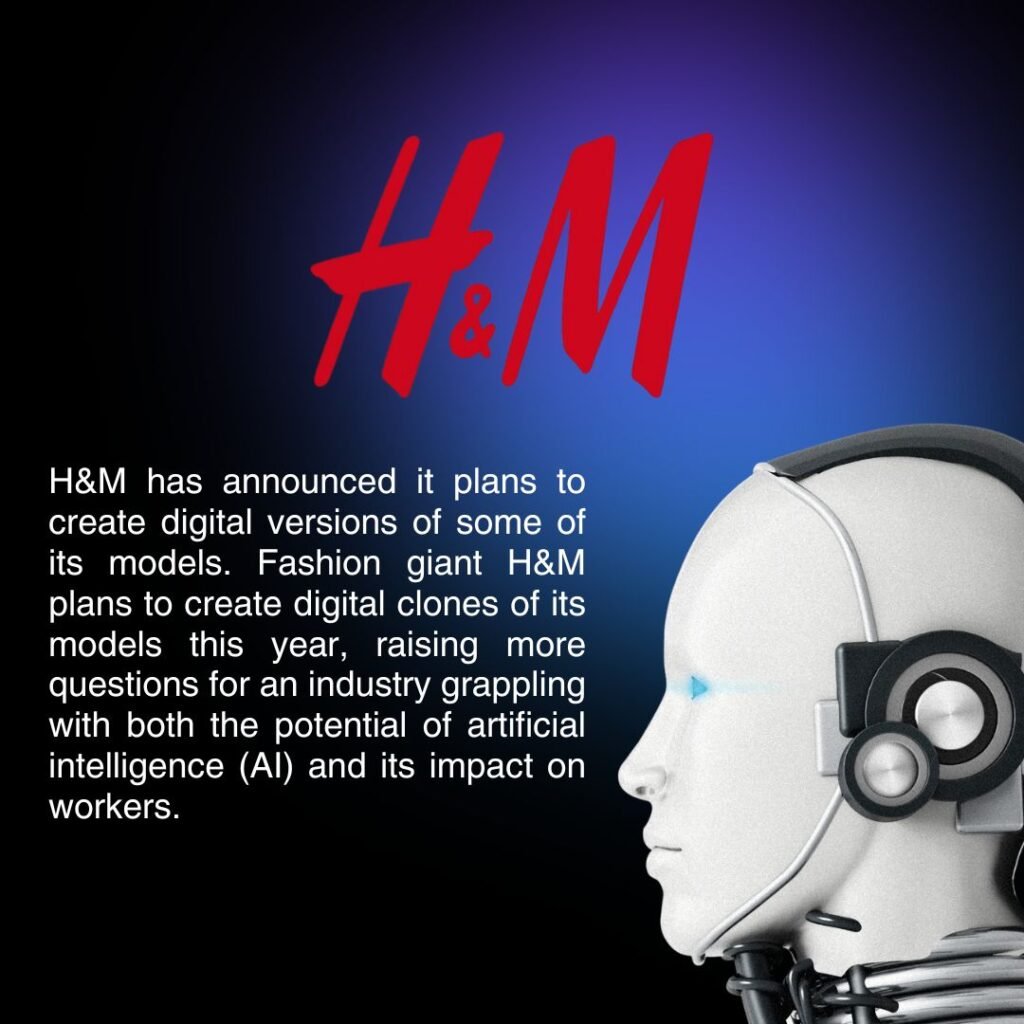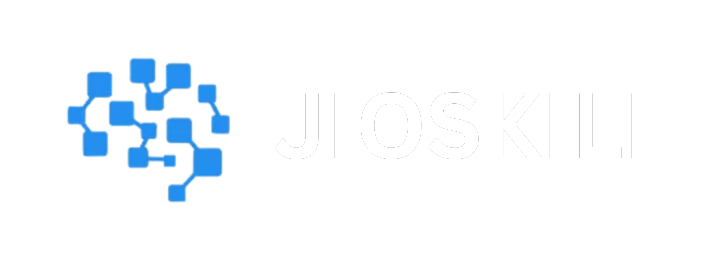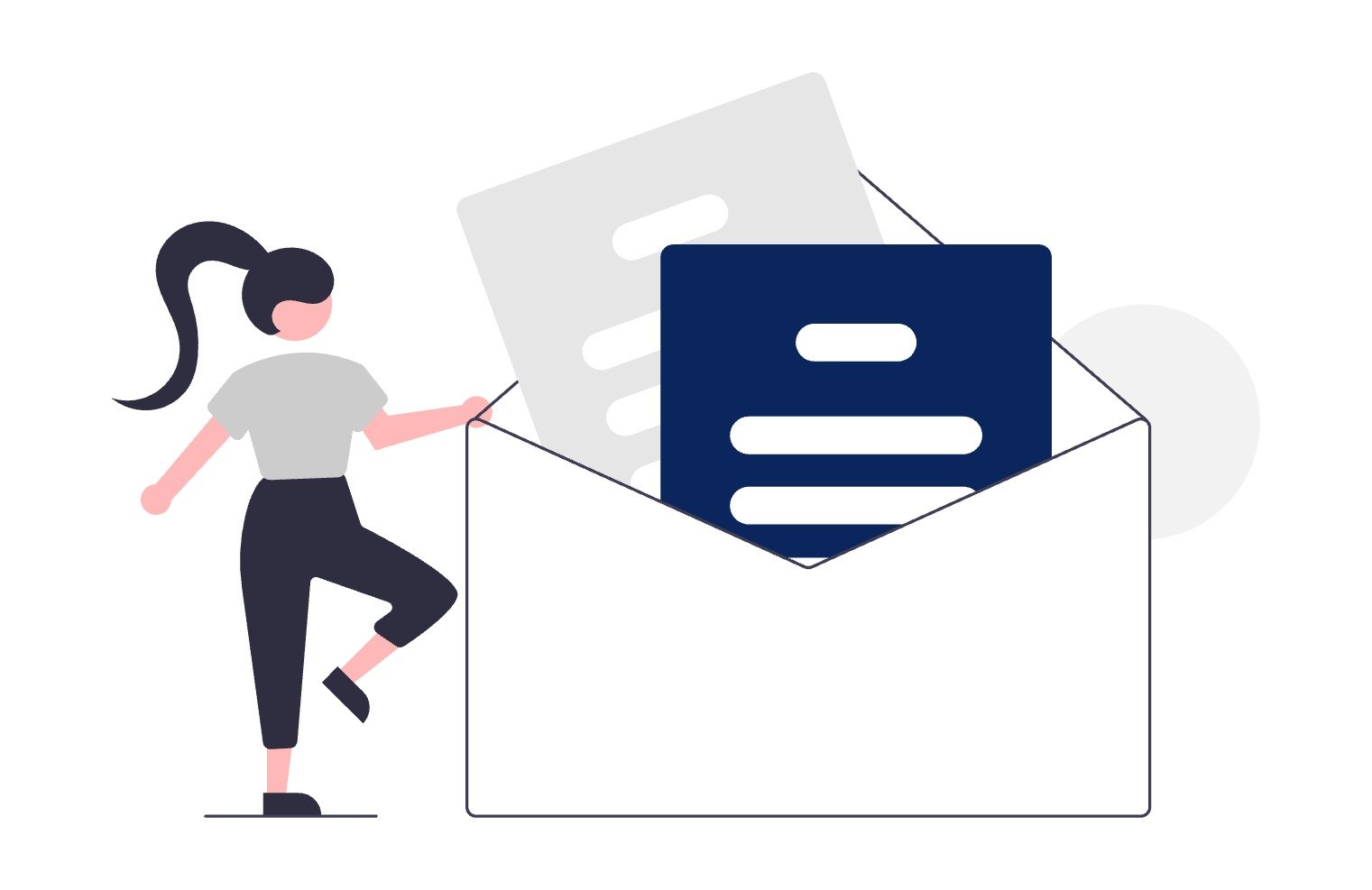Currently Empty: ₹0.00
How AI is Changing Digital Marketing (2025)
How AI is Changing Digital Marketing (2025)
Introduction:
Digital marketing has experienced a seismic shift in recent years, and one of the key drivers of this transformation is artificial intelligence (AI). AI is Changing Digital Marketing . From automation to personalization, AI is reshaping the way businesses approach digital marketing. But what exactly does this mean for marketers, AI is Changing Digital Marketingand how can companies leverage AI to gain a competitive edge? In this post, we’ll break down how AI is revolutionizing the digital marketing landscape, with real-world examples and case studies.
Problem:
Traditional Marketing Is Not Up to Speed
Let’s face it: traditional marketing methods are no longer relevant in the data-driven, fast-paced world of online commerce. Among the several responsibilities that marketers have had for a long time are customer segmentation, content creation, performance tracking, and conversion optimization. AI is Changing Digital Marketing But as consumers become more connected, informed, and demanding, marketing strategies need to adapt.
The challenges faced by marketers:
1- Data Overload: Although marketers are gathering more data than ever before, they may find it difficult to sort through it all. There is a wealth of data available from email marketing, social media, website analytics, and other sources, but how can you use this data to make better decisions? AI can help with this.
2-Growing Competition: Businesses are fighting for customers’ attention in crowded online environments as digital marketing becomes more accessible. You must be efficient and inventive if you want to stand out from the pack.
3 – For marketers, increasing return on investment (ROI) is a constant source of pressure. Continuous campaign optimization is required for this, but manually altering advertisements or content takes time and isn’t always successful.
Agitation: The Risky Business of Digital Marketing
In the competitive world of today, the stakes are very high. Because there are so many companies fighting for customers’ attention online, lagging behind could result in lost business from more nimble rivals.AI is Changing Digital Marketing.
A 2019 McKinsey study, for example, found that 70% of businesses said they used AI to improve customer interactions. Gartner, on the other hand, discovered that companies using AI-powered marketing solutions experienced a 30% rise in client retention rates. In other words, companies that don’t use AI are probably losing out on a lot of potential.AI is Changing Digital Marketing.
AI-powered solutions are helping businesses become more profitable, efficient, and customer-focused. If your business is still relying on batch-and-blast email campaigns, generic ads, or human data analysis, you may find it difficult to keep up with competitors that are using AI Changing Digital Marketing.
Response: How Artificial Intelligence is Changing Digital Marketing

Here comes artificial intelligence (AI), a technology that promises to solve many of these problems. Through machine learning, automation, and predictive analytics, artificial intelligence (AI) assists marketers in making better decisions, increasing efficiency, and ultimately creating more engaging consumer experiences.
1.Using Data to Guide Decisions
One of the biggest ways AI is transforming digital marketing is by making data more actionable. The enormous volumes of data that AI can process would take human marketers far too long to extract insights from. Businesses may now make data-driven decisions instantly thanks to this. Think about Netflix. Their AI-powered recommendation system creates about 75% of the information that users view.AI is Changing Digital Marketing. By maintaining customer interest and subscriptions, this customized experience helps Netflix maintain its lead over rivals in the entertainment industry. In order to recommend content that keeps viewers interested, AI assists them in continuously analyzing viewing preferences, behaviors, and habits.
2.Scalable Customized Customer Experiences
Customization is now a need rather than a “nice-to-have.” AI is the key to making this a reality at scale. Customers want brands to understand their demands and provide bespoke experiences. An excellent illustration of AI-powered personalization in action is Amazon. AI is Changing Digital Marketing. Their recommendation engine makes product recommendations based on your browsing and buying history using artificial intelligence. 35% of Amazon’s overall revenue has been attributed to this AI-powered technology.
3. Customer service and chatbots
Chatbots with AI capabilities are revolutionizing customer service. Businesses can provide prompt answers to consumer questions by offering real-time, round-the-clock help, which increases client loyalty and satisfaction. Sephora Virtual Artist is a chatbot that Sephora utilizes to assist consumers in selecting makeup according to their tastes and skin tone. By using AI to suggest products based on the customer’s input, the chatbot increases engagement and boosts revenue. 72% of customers stated in 2021 that they favored utilizing chatbots to get prompt solutions to their inquiries. However, chatbots are capable of more than just answering simple questions; they can also monitor client interactions over time, gaining valuable information about preferences, past purchases, and behavior. AI is Changing Digital Marketing.This enables companies to customize subsequent discussions and offer a further customized experience.
4. Automated Curation and Creation of Content
One of the most time-consuming components of digital marketing is regularly producing original, captivating content. Thankfully, a lot of this procedure is being automated by AI. AI is used by programs like Copy.ai and Jasper to produce excellent copy for blogs, emails, social media postings, and other media. AI is able to examine previous postings that have been effective, spot popular subjects, and use those insights to create new content ideas. AI may significantly speed up content creation and shorten the time it takes to produce new content, but human involvement is still required for innovation and improvement.
Curation of content is another application of AI. AI is used, for instance, by platforms such as Curata to suggest videos, blog entries, and articles that are appropriate for a company’s target market. This enables marketers to provide insightful content and stay abreast of trends without having to invest hours in keeping up with the most recent developments in the business.
5. Campaign Optimization and Predictive Analytics
Predictive analytics is another potent use of AI in digital marketing that aids in forecasting future trends, consumer behavior, and campaign effectiveness. Artificial intelligence (AI) can forecast a customer’s propensity to convert by examining past data and trends.
For instance, by offering actionable information on which content is connecting with audiences and which channels are best for reaching target demographics, HubSpot’s AI-powered Marketing Hub assists companies in real-time campaign optimization.AI is Changing Digital Marketing, Indeed, 74% of marketers claim that AI-powered solutions boost return on investment, and 66% of marketers say they utilize them for campaign optimization.
Businesses can now manage resources more effectively and increase ROI more quickly than ever before thanks to the ability to evaluate data and modify campaigns on the fly.
6. Improved Targeting for Advertising
AI is also very important for digital advertising optimization. Machine learning algorithms are used by platforms such as Google Ads and Facebook Ads to help businesses better target their ads. AI uses user data, including demographics, search history, and browsing history, to deliver the most relevant advertisements to the appropriate audience at the appropriate moment.
Coca-Cola, for instance, employed AI to better target their advertising efforts and boost interaction with younger consumers. Coca-Cola increased its ad engagement rate by 10% by using AI to track sentiment and personalize content. This illustrates how AI can improve the impact and relevancy of advertisements, increasing conversion rates.
Case Study: H&M’s Use of AI
Let’s examine more closely how AI benefits a well-known company like H&M. “Visual Search” is an AI-powered feature that the worldwide apparel store implemented to improve its online shopping experience.V When customers upload pictures of clothes they like, the AI system makes recommendations for related products that are on sale on the H&M website.

By offering highly relevant product recommendations in real-time, this not only improves the user experience but also helps H&M increase sales. Conversion rates at H&M have increased by 15% in markets where AI capabilities like Visual Search have been implemented.
AI is also being used by the business to improve inventory control. AI reduces waste and makes sure that customers can locate the things they want when they need them by helping H&M stock the appropriate products in the correct quantities based on demand predictions.
Conclusion,
AI will drive the future.
AI is a fundamental change in how companies approach digital marketing, not just a fad. AI is helping businesses make better decisions, optimize advertising, and ultimately provide better outcomes by automating tasks and delivering tailored experiences at scale.
The main lesson for marketers is that AI won’t take the role of human creativity or intuition. Rather, it is a tool that may assist marketers in increasing efficiency, making smarter, data-driven decisions, and meaningfully engaging customers. AI is Changing Digital Marketing.
Those who adopt AI early on will have a competitive edge in the field of digital marketing as it develops further. AI will drive marketing in the future; are you prepared to capitalize on this?
1.How is digital marketing being changed by AI?
The answer is that AI makes marketing tactics more effective and data-driven by improving data analysis, automating tasks, optimizing ad targeting, and enhancing personalization. AI is Changing Digital Marketing.
2.How is customer targeting enhanced by AI?
In order to enable more accurate and efficient targeting, artificial intelligence (AI) divides up massive datasets into client segments according to behavior, preferences, and demographics.
3.How does AI affect the production of content?
In order to speed up content development and increase relevance for certain audiences, artificial intelligence (AI) systems can provide content ideas, write copy, and even design images.
4.Can digital marketing tasks be automated by AI?
Yes, artificial intelligence (AI) saves time and boosts productivity by automating processes like social media posting, email campaigns, and ad management.
5.How might AI enhance SEM and SEO tactics?
Answer: AI aids in predictive analytics, content optimization, and keyword analysis to raise rankings and optimize return on investment for both sponsored and organic search campaigns.
6. How is social media marketing affected by AI?
In order to assist marketers produce timely and pertinent social content and increase engagement, artificial intelligence (AI) analyzes trends, tracks social sentiment, and automates answers.
7. How does influencer marketing get impacted by AI?
Indeed, AI optimizes influencer alliances and campaign outcomes by identifying the top influencers based on audience data and performance .
8. How does email marketing leverage AI?
AI increases open and conversion rates by personalizing email content, streamlining send times, and anticipating consumer behavior.
9. Does AI aid in the analytics of digital marketing?
In response, artificial intelligence (AI) enables marketers to swiftly make data-driven decisions by analyzing enormous volumes of data, delivering real-time insights, and forecasting trends.
10. Does the use of AI in marketing raise any ethical issues?
Yes, there are worries about algorithmic biases, data privacy, and the possibility of consumer manipulation or over-targeting.
11. Can human marketers be replaced by AI?
The answer is that artificial intelligence (AI) will probably not completely replace human marketers; rather, it will enhance their efforts by automating tedious jobs and offering insightful data to help with decision-making.
Website Link – jioskill.com , codexon.in







